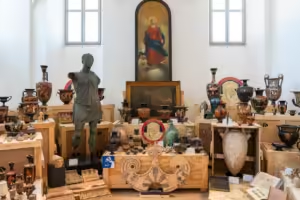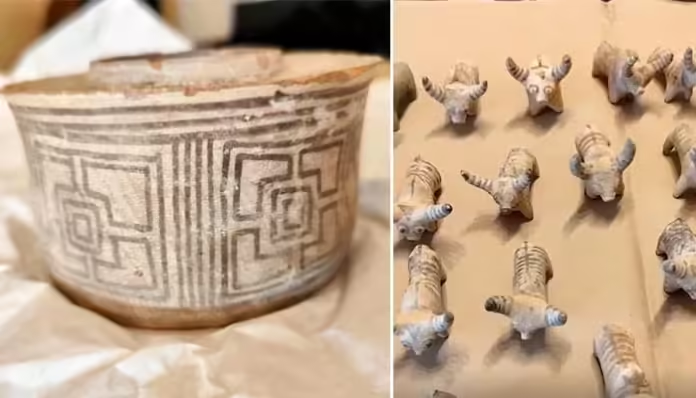Italy has returned ancient Balochistan Artifacts dating 5,000 years back to Pakistan
This is in fact a strong testament to the abiding friendship between Pakistan and Italy. Italy returned many ancient artifacts of Balochistan, dating some 5,000 years back, to their home. These priceless relics were stolen from Kuli and Naal archaeological sites and represent a civilization thriving long before the Indus Valley Civilization — a window to early Bronze Age South Asia.
The artifacts, seized by Italian authorities, finally arrived in Pakistan on October 30, 2025, after extensive diplomatic coordination and legal efforts. Their return is not just about the recovery of stolen heritage; it’s about the revival of a historical narrative deeply engrained in the ancient soil of Pakistan.

A Symbol of Trust and Cooperation
The Embassy of Pakistan in Rome referred to the handover as a “symbol of strong bilateral cooperation,” emphasizing the respect that both countries have for the preservation of culture. In the past 18 years, around 100 heritage pieces were successfully recovered and repatriated — a massive achievement due to continuous cooperation between cultural institutions of Pakistan and the Italian authorities.
Italy’s gesture goes far beyond the diplomat’s courtesy; it echoes an academic and ethical dedication to the protection of world heritage. In a world where cultural theft and illicit trading in antiquity have become international issues, this act shines as a beacon of integrity and shared humanity.
A Legacy of Archaeological Partnership
The relationship between Italy and the archaeology of Pakistan is neither new nor ephemeral. The Italian Archaeological Mission in Swat, established as early as 1955, had been one of the longest-standing international research collaborations in the area. Italian archaeologists have played an important role in unearthing Buddhist relics, ancient monasteries, and now, through this recent gesture, in preserving the prehistoric legacy of Balochistan.
The embassy also extended heartfelt recognition to the Italian scholars and archaeologists, whose dedication continues to enrich Pakistan’s historical discourse. Their decades-long efforts in documenting, preserving, and promoting Pakistan’s ancient heritage have fostered a bridge of knowledge and cultural appreciation between the two nations.
Unveiling the Secrets of Kuli and Naal
The Kuli and Naal sites of Balochistan are among the most significant prehistoric settlements in South Asia, dating back to about 3000 BCE. These sites reflect evidence of early urban organization, pottery craftsmanship, and trading networks predating those of the Indus Valley Civilization. The returned artifacts-intricately crafted ceramics, figurines, and tools-tell stories of a community skilled in art, agriculture, and symbolism.
Their return not only restores the physical heritage of Pakistan but also re-ignites academic curiosity and national pride. Each artifact, once lost to the black market, now reclaims its rightful place in the country’s narrative – serving as a timeless reminder of Pakistan’s deep-rooted cultural evolution.
Reclaiming the Past, Inspiring the Future
The restitution of these ancient artifacts from Balochistan represents a triumph of diplomacy, persistence, and respect for cultures. It underlines Pakistan’s firm commitment to the protection of its history and Italy’s praiseworthy adherence to the ethical stewardship of world heritage.
As these relics find their way back to Pakistani museums and research institutions, they carry with them the silent whispers of millennia — stories of humanity’s earliest creativity and resilience. Their return does not stop at a diplomatic achievement; it is a **homecoming of identity** that bridges the ancient and the modern, the local and the global.
For more stories celebrating Pakistan’s rich history and global partnerships, please visit Pakistan Updates.




